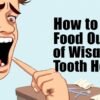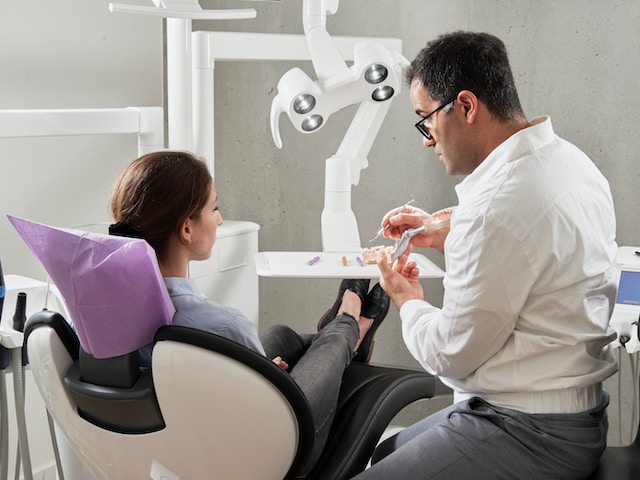Your body may be attempting to tell you something is wrong if you experience any soreness, gum swelling, or spitting up blood after brushing or flossing. It might signal the beginning of gum disease. Your natural curiosity is How to cure gum disease without a dentist. Gum disease can be treated at home at a low cost and with great success; prevention is key. By routinely maintaining good oral hygiene, periodontitis can be treated in a step-by-step fashion.
Any form of pain can be irksome and aggravating. Compared to most of your other organs, your teeth and gums function the most. Due to wear and tear, aging, and oral trauma, the teeth and gums may become less healthy. You can attempt various home treatments in addition to the dentist’s advice on how to treat gum disease.
To learn how to cure gum disease without a dentist with natural medicines, keep reading.
What Is Gum Disease And Why Should You Get Treatment?
Periodontal disease, often known as gum disease, is a widespread disorder that compromises the health of your gums. Redness, swelling, bleeding, and discomfort are caused when plaque builds up and hardens on the teeth and around the gums.
Infection of the tissues around the tooth by oral bacteria results in inflammation and periodontal disease. Tartar eventually forms from the bacteria-caused plaque that accumulates on the teeth. It might result in tooth loss and even worsen other health problems if left untreated. Gum disease must be treated to preserve oral health and stop additional harm. So, let’s read the full post to learn how to cure gum disease without a dentist.
Gum Disease Symptoms:

There are nevertheless warning indicators that can point to the presence of the disease even though gum disease might advance painlessly and with few visible signs. Despite their subtlety, periodontal disease symptoms are real and should not be disregarded. Gum disease signs and symptoms include:
- Gums that bleed both during and after brushing.
- Puffy, red, and bloodshot gums.
- Foul breath or a lingering bad taste in the mouth.
- Gum recession.
- Deep spaces between the gums and teeth.
- Teeth that are movable or loose.
Gum Disease Factors:
- Plaque is a leading contributor to gum disease.
- Gingivitis risk can be raised by hormonal changes associated with puberty, menstruation, pregnancy, and menopause.
- Cancer, HIV, and diabetes are just a few of the diseases that can harm gum health.
- Certain drugs may decrease saliva production or promote aberrant gum tissue growth, both of which can exacerbate periodontal disease.
- The two main causes of periodontal disease are poor dental hygiene and smoking.
- An individual may be more vulnerable to gingivitis if they have a family history of dental illness.
When To Consult A Doctor?
Treatment for gingivitis should be sought as soon as possible to improve the likelihood of a speedy and complete recovery. Gingivitis can seriously harm teeth and result in other health problems if it is not addressed.
If you suffer any of the following signs or symptoms, you should speak with your doctor or dentist:
- bad tooth discomfort
- ongoing foul breath
- profuse bleeding from the gums
- Extreme gum swelling or inflammation
- If necessary, your dentist may recommend a periodontist while cleaning your teeth.
You can learn from the dental hygienist how to correctly maintain healthy gums by using dental tools and supplies. Additionally, your dentist might suggest additional cleanings and offer advice on how to keep up.
How To Cure Gum Disease Without A Dentist In 6 Easy Steps?
There are some steps you may take on your own at home to assist in addressing the problem and stop it from coming back if you want to know how to cure gum disease without a dentist.
1. Green Tea And Honey:

Green tea contains several healthy antioxidants that have been shown to considerably lessen gum inflammation. By slowing down some germs in the mouth that might cause gum disease, the polyphenols in green tea assist in preventing it. Organic honey has potent antibacterial and antiseptic qualities in addition to being effective in treating gum disease and avoiding tooth decay.
2. Salt Water For Gum Disease:
Salt is an old-fashioned treatment for gum disease because it is a potent natural disinfectant that aids in the healing of swollen gums and the eradication of harmful germs. After dental hygiene, you can rinse your mouth with sea salt. Mix sea salt and hot water and then let it cool for some time to maintain the health of your mouth.
3. Using An Antibacterial Toothpaste:

With antibiotic dental products, you may continue to battle plaque long after you’ve finished your dental hygiene regimen. Furthermore, there is antigingivitis toothpaste that can remove plaque from your gum line for gums which has been shown through scientific studies to be healthier. With mouthwash, you can get plaque microorganisms from elusive locations.
4. Give Up Smoking:
If you smoke, quitting is one of the finest things you can do to manage gum disease. Your mouth will suffer if you smoke. In addition to greatly raising your risk for gum disease, it can also hurt the outcomes of whatever treatments you attempt.
Ask your doctor for advice if you smoke and wish to stop. He or she might be able to provide you with aids like gum or nicotine patches. Additionally, your doctor could suggest that you seek counseling or join a support group for smokers who want to quit. Both of these options can help you quit.
5. Optimal Nutrition For Dental Health:
Your diet is the first step towards good oral health. It’s crucial to maintain a wholesome, balanced diet if you want to lower your chance of developing gum disease. The body naturally fights germs and plaque that cause gum disease by producing saliva, which can be boosted by consuming lots of fresh produce, whole grains, nutritious proteins, and dairy products. Saliva is also produced while eating these foods in sufficient amounts.
You can maintain the health of your teeth and gums by avoiding sugar-filled foods and beverages. Consult a dietitian or your doctor for assistance if you have any special dietary requirements.
6. Drink A Lot Of Water All Day Long:

A key component for keeping excellent oral hygiene and preventing gum disease is drinking plenty of water. Food particles and germs that could build up in the mouth can be removed with the help of water. This lessens the possibility of plaque accumulation and may support maintaining healthy gums.
At least eight 8-ounce cups of water should be consumed each day. Try bringing a water bottle around with you to serve as a reminder to stay hydrated if you’re having trouble reaching this objective. Fresh fruit can be used to add flavor to water, or you can choose sugar-free beverages like bubbling water or herbal teas.
Conclusion:
It’s critical for you in general to get rid of gum disease. Gum disease not only increases the risk of tooth loss but also of other significant health problems like diabetes, heart disease, and stroke. Do something right away if you suspect you have gum disease.
If you want to know how to cure gum disease without a dentist, take into account the above-mentioned procedures. If not, be sure to speak with your dentist for additional details and care. By taking the appropriate precautions today to take care of your gums, you can avoid developing major health problems later on.










